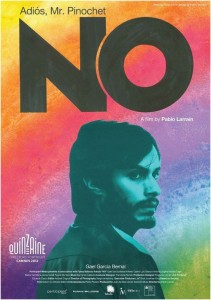 Since its debut at Cannes last year, Pablo LarraÃn’s No has been earning buzz from the festival and awards scene. This Chilean historical drama centers around the 1988 referendum to keep dictator Augusto Pinochet in office. If that premise sounds dull to you, it isn’t. No is simply one of the most charming, emotional, brilliant films I’ve seen in a long time.
Since its debut at Cannes last year, Pablo LarraÃn’s No has been earning buzz from the festival and awards scene. This Chilean historical drama centers around the 1988 referendum to keep dictator Augusto Pinochet in office. If that premise sounds dull to you, it isn’t. No is simply one of the most charming, emotional, brilliant films I’ve seen in a long time.
The story revolves around René (Gael GarcÃa Bernal), a clever ad executive who seems to have an affinity for putting mimes in TV commercials. He’s young, he’s modern, he’s used to playing with the latest gadgets in order to sell them, and he’s spent enough of his life outside of Chile to not fully comprehend the horrors of Pinochet’s brutal, secretive dictatorship. An old family friend asks him to consult on an ad campaign during the referendum. Each night, the “yes” and “no” campaigns have fifteen minutes to reach out to the public. While others see this as an opportunity to expose the dictatorship’s dark side, René views the campaign as a chance to sell the country a concept, its own future happiness.
Because of René’s privileged background and his travels, the viewer does not have to be well versed in Latin American history in order to appreciate No. The bodies, the oppressive violence, the torment of the fate of the “disappeared” emerge as René goes from a relative outsider to a perceived threat to the established government. LarraÃn does not have to be graphic with the threats to René and his new comrades; a simple scrawled threat or a child’s toy turned on in the middle of the night is terrifying enough.
With strong writing, No has the visual style to back up its content and history. How refreshing it is to go to a movie and see no CGI. In fact, in this era of movie magic, this is more like movie realism. Shot on low definition U-matic film, the whole thing looks like it is straight out of the ’80s. This style allows the viewer to suspend disbelief while at the same time feeling uncertain as to which footage is genuinely from the time period and what is recreated.
Another credit to No is its buoyant sense of humor. René’s ads are deliciously outdated by today’s standards, with a fondness for cheesy jingles, dancing in the street, and, yes, mimes. A few American celebrities make cameos from actual archive footage from the time, with Christopher Reeves shamelessly identified as “SUPERMAN” to help the “no” campaign. A film like this could easily get caught up in its own gravitas, but LarraÃn pulls back, instead by demonstrating the marvel of the microwave oven or by making grown men drop profanities when they are supposed to be professional. The casting is superb, GarcÃa Bernal is a marvel as he drifts between cheeky, controversial creator to concerned father with the ease of a chimera. No may depict history, but with any luck, history will also remember the film as well.
No opens in New York and Los Angeles on February 15.


